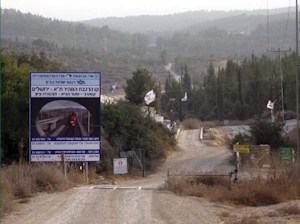A number of workmen on the new Tel Aviv-Jerusalem express train line were saved from death when a tunnel they were working on collapsed over a month ago.
For weeks before the incident, the contractor on the A1 rail line to the capital and the company supervising the work on behalf of Israel Railways debated the questions of expanding the support mechanism for the tunnel roof with steel arches, and of who would pay for the additional work. In the end, nothing was done and a 15-meter-high chimney in the ceiling gave way.
The contractor's employees, who anticipated the danger, fled before the collapse and were not injured.
The rail project, which is well behind schedule, will now be delayed for many more months.
Such collapses are not that uncommon, especially on complex engineering projects such as the 820-meter tunnel being dug for the new line in the Arazim Valley, outside the city. But this was the second collapse in two months, because the supports were inappropriate for the type of rock in the tunnel.
If this were the only problem on the construction product, it might have passed over quietly. But rumors are the project manager is about to be fired - again; two of the largest Israeli firms specializing in supervising construction projects have already quit in anger over the management of the project.
One of the contractors has already filed NIS 500 million worth of lawsuits against Israel Railways, after it was awarded part of the work before the railways had even finished planning.
The rail line was recently rescheduled for completion in 2017, but this is now in doubt. The original date for starting operations was supposed to be in 2008. In addition, there is the problem of how much it will really cost in the end; the original budget has already doubled. The initial estimates were for NIS 3.2 billion, and they have already climbed to NIS 6.8 billion. The line is supposed to be able to transport 7 million passengers a year.
The project started in 2001 after the failure of the upgrade of the old Tel Aviv-Jerusaelm rail line - one of the biggest transportation debacles in Israeli history. So far, only the section between Tel Aviv and Modi'in has been completed. The remaining part of the project, from Latrun to Jerusalem, is divided into four sections, each being built by a different contractor. One is almost finished, except for a bridge.
All together, these sections will be 32 kilometers in length, of which 20 kilometers are tunnels and 5 kilometers are bridges.
Another issue is that the new line will run on electricity with electric locomotives. This requires Israel Railways to have its electrification plan for the railways in place by the time the line opens in 2017. The railways published its initial tender for electrification in 2006, but canceled it two years ago as the project was delayed. The new tender is scheduled to be published this year, but the planner of this aspect of the project was chosen only two weeks ago and the completion of the tender is still quite a long way off.
Israel Railways said "the project is expected to be completed in 2017, but this depends on a number of legal and statutory decisions that could delay it. It is natural for one of the largest infrastructure projects ever done in Israel to have to contend with a number of pitfalls, but it is advancing properly and professionally. The source of the complaints, slander and mudslinging is contractors with whom the railways decided to end its contractual relations."
Source: The Marker

